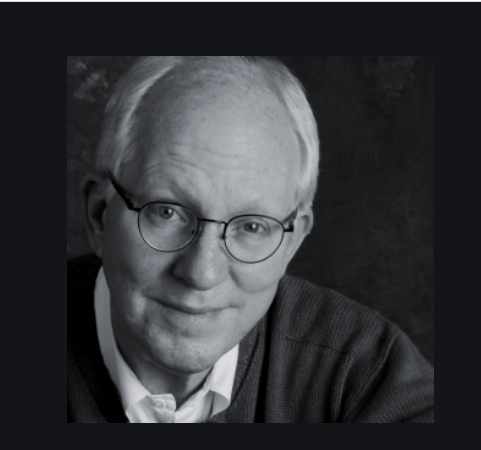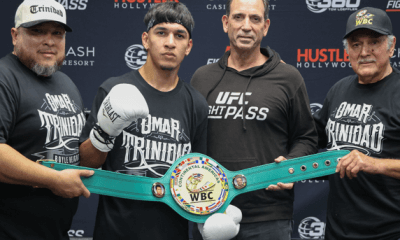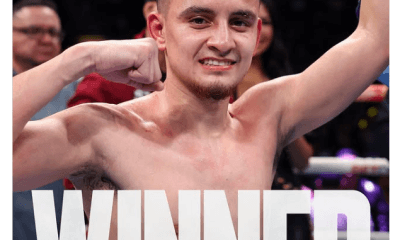Featured Articles
Award-Winning Writer John Schulian Reflects on His Days on the Boxing Beat

A TSS CLASSIC: Bill Shoemaker was born to ride thoroughbred race horses. Pablo Picasso to paint. Tony Bennett to sing. Marlon Brando to act. John Schulian to write.
Schulian has written for six newspapers including the Washington Post, Chicago Sun-Times and Philadelphia Daily News, and has contributed to such weighty periodicals as Sports Illustrated, Gentlemen’s Quarterly, Inside Sports and Playboy.
In time, Schulian would turn his attention to the bright lights of Hollywood where he was a staff writer for “L.A. Law,” “Miami Vice,” “Wiseguy,” “The Slap Maxwell Story,” and “Midnight Caller.”
Schulian also co-created the worldwide hit television show “Xena: Warrior Princess.”
And if that wasn’t enough, Schulian edited or co-edited four sports anthologies and had three collections of his sports writing published: “Writers’ Fighters And Other Sweet Scientists,” “Twilight of the Long-ball Gods,” and “Sometimes They Even Shook Your Hand.”
After our initial meeting over a three-hour lunch and through continued correspondence via email, the Los Angeles native who holds journalism degrees from the University of Utah (BA) and Northwestern University (MS) agreed to answer a handful of questions for “The Sweet Science.”
Like so many people, Muhammad Ali’s passing at age 74 in Arizona hit home for Schulian.
“My first thought is that I’m hardly alone in having memories of Ali,” he said. “He belonged to the public in a way that no other athlete – no other public figure, really – has belonged to the public. Some people still remember how he shed the name Cassius Clay and stood over the supine Sonny Liston in Lewiston, Maine, daring the big ugly bear he had just knocked down – or had he? – to get up.
“Others remember Ali’s trembling hand when he lit the Olympic torch in Atlanta in 1996. And then there are those who lucked into more personal moments: a kid who met Ali by chance in an airport or a woman who saw him give her husband the once-over at a banquet and then tell her, “You can do better.”
“Sometimes it seemed as if Ali was put on earth to brighten peoples’ lives that way. I know he certainly brightened mine the night I was sitting next to him on the dais at a banquet in New York. He drew the globe complete with continents on a paper placemat, then he nudged me and pointed at it. “I used to be champion of all that,” he said in a raspy voice. He was through with fighting by then, and yet his words still gave me a chill. For some of us, he would always be a champion even if he wore no crown.”
Schulian, who was offered Red Smith’s column at The New York Times, which he turned down, covered boxing in the 1970s and 1980s. Among the many fights he watched, which stand out?
“I wish I could put an Ali fight on this list, but all the fights I covered showcasing him never should have happened,” he said. “He left the last vestiges of his greatness in Manila, just as Joe Frazier did, and it was only after he was back home that I began writing about him.
“The one really good fight Ali had in that era was with Earnie Shavers in Madison Square Garden, but Ali still took some ferocious shots, and I’m sure he paid for them later.
“Now, to get back to your question: [Ray] Leonard-[Thomas] Hearns was a great fight. Hearns had him beat twice, but Leonard had too much heart and brainpower to be stopped.
“The first [Aaron] Pryor-[Alexis] Arguello fight, in Miami, was a study in courage and the thrilling nobility that such a brutal sport can summon from combatants. Of course, a lot of people scarcely remember that because of Duk Koo Kim’s fatal injuries in the ring the next evening.
“[Roberto] Duran-Leonard I was fascinating because of the education Leonard took away from it. In their second fight, he let Duran know that school was out. The best fight I covered – the most electric fight and the most dramatic – was [Marvin] Hagler-Hearns. I never saw anything like it. They charged out of their corners at the start of the first round, and everybody at press row and in the crowd came out of their seats like they’d just taken 1,000 volts in the ass.
“Nobody sat down until Hagler had landed so many punches that all of Hearns’ synapses were misfiring. Of such violence are legends made.”
There are enough great boxers to fill a good-size garage. Who stands above the rest?
“I didn’t start writing about boxing extensively until after the Thrilla in Manila, which means I covered Ali at a time he shouldn’t have been fighting at all,” said Schulian, who had his first novel, “A Better Goodbye,” published in 2015. “So I can’t call him the best. The Hagler-Hearns fight was the best I covered and the most electric event I’ve seen in any sport, but that doesn’t put Marvelous Marvin atop my list.
“The same goes for Roberto Duran, who was a brilliant defensive fighter as well as a terrifying puncher, and Larry Holmes, a great heavyweight with a wrecking-ball jab and the bad luck to succeed Ali as champion.
“The best fighter in my time, however, was Sugar Ray Leonard. He proved how big his heart and talent were when he beat Hearns, but that was just part of what made him so great. He also had a rapacious intellect when it came to boxing. He watched film of every great old fighter and he went to school on all of them. And his education in the ring was enhanced exponentially by the way his trainer Angelo Dundee brought him along, pitting him against every possible type of opponent, sluggers and cutie pies, southpaws and stylists, and defensive specialists and guys who, given the chance, would try to gouge out his eyes.
“Leonard beat them all, and did it with the same flair and personality that the public fell in love with at the 1976 Olympics in Montreal. Once his name was included among boxing’s all-time greats, however, something in him changed. He began retiring and un-retiring and he slowly got rid of all the people who had helped him get to the top, Dundee and lifetime friends like Dave Jacobs and Janks Morton, and the lawyer who made sure he would always be financially secure, Mike Trainer.
“It happens in every profession, I suppose, but that doesn’t mean I have to like it. For what it’s worth, I don’t think Leonard beat Hagler, either. But he was still the best fighter I covered in what was boxing’s last golden era.”
What separates covering boxing from other sports? “I hope you don’t mind if I quote myself,” he said. “This is from my introduction to “At The Fights,” which George Kimball (RIP) and I edited for the Library of America.
“[Boxing] is the best friend a writer ever had. It doesn’t matter whether the writer is a newspaper wage-slave feverishly trying to make his deadline after a title fight or a big-name author who has parachuted in to survey toe-to-toe gladiators and the exotica surrounding them.
“There is an undeniable jolt to watching violence in the ring, an almost electrical charge composed of equal parts beauty and savagery, and it can stir the poet in a writer who doesn’t realize he has poetry in him.
“I’m sure our very best boxing writers, from A.J. Liebling to Mark Kram to Richard Hoffer, would have wonderful things to add to that, but if you read their work, you’ll see the points I made driven home in high style.”
Was it more fun covering boxing during your era versus the present day? “I’m not out in the gyms and ballparks anymore so it’s hard for me to give you a definitive answer,” Schulian pointed out. “But judging by what I hear from old sports writing friends, read in papers and magazines, and see on TV, the job looks a hell of a lot harder than it used to be.
“The best sport of all for guys who would bend your ear was boxing. If you walked into a gym or arena with a notebook in your hand, you were instantly surrounded by people with stories to tell. All anyone cared about was that you spelled his name right, and that included Don King, who just laughed every time he got caught short-changing another fighter.
When Angelo Dundee was in his final years, I needed to talk to him for a piece I was writing about Ali. It had been years since we’d last spoken, so I felt compelled to introduce myself. “Why you doin’ that?” Angelo said. “I oughta punch you in the nose. We’re friends, for crying out loud.”
For the late Sports Illustrated scribe Pat Putnam, he used Liebling’s words to help elevate his prose. What took Schulian to the next level?
“Maybe I would have written better if I’d read Liebling too, but, no, I never did anything like Pat did,” he noted.” The fighters were always my inspiration. If they weren’t up to the challenge, then I’d fall back on the world I was in at every fight, with a cast of characters that seemed to have stepped out of a noir novel. I didn’t always write an “A” story, but the material for one was almost always at my disposal.”
Schulian received the prestigious PEN/ESPN Lifetime Achievement Award for Literary Sports Writing this year.
“It was the biggest and best surprise of my career,” he said. “You have to realize that I left daily newspapering for Hollywood thirty years ago. It was a move that I always assumed rendered me a non-candidate for any journalism awards even if I kept my hand in sports writing by doing occasional pieces for GQ, Sports Illustrated, the L.A. Times, Deadspin, and Alex Belth’s Bronx Banter Blog.
“What can I tell you? I’m a compulsive writer. And there were things I wanted to say and subjects that editors wanted me to write about. The great discovery of this second phase of my sports writing career was that l felt like I’d somehow become better at putting words on paper.
“Maybe I needed time away from the grind of doing four columns a week and always having a freelance magazine piece going on the side. Maybe I learned something from the incredibly smart people I worked with in TV – nothing about writing prose, mind you, but plenty about thinking and challenging the norm and being exposed to new ideas.
“Whatever the reason, I ended up doing some of the best pieces of my career, about Ali, Josh Gibson, Chuck Bednarik and the obscure legends that help make baseball such a compelling game. But once they were in print and I’d cashed the checks I got for them, I figured that was the end of the line.
“When PEN e-mailed me early this year to say I’d won the award, I was gobsmacked. I didn’t even know I was in the running, and I still don’t know who nominated me, but I hope that whoever it was realizes how grateful I am. I’m equally grateful to Dave Kindred, Sally Jenkins and Senator Bill Bradley, who comprised the panel that selected me.
“They put me in the same sentence with Roger Angell, Dan Jenkins, Frank Deford, Dave Anderson and Bob Ryan, the award’s previous winners. It’s hard to believe that a guy who co-created “Xena” could keep such distinguished company, but I’ve got the plaque to prove it.”
EDITOR’S NOTE: This story originally ran on August 23, 2016
——
Rick Assad has covered sports in Southern California for almost three decades. You may contact him at yankeespride55@gmail.com
Check out more boxing news on video at the Boxing Channel
To comment on this story in the Fight Forum CLICK HERE
-

 Featured Articles3 weeks ago
Featured Articles3 weeks agoThe Hauser Report: Zayas-Garcia, Pacquiao, Usyk, and the NYSAC
-

 Featured Articles2 weeks ago
Featured Articles2 weeks agoOscar Duarte and Regis Prograis Prevail on an Action-Packed Fight Card in Chicago
-

 Featured Articles1 week ago
Featured Articles1 week agoThe Hauser Report: Cinematic and Literary Notes
-

 Book Review4 days ago
Book Review4 days agoMark Kriegel’s New Book About Mike Tyson is a Must-Read
-

 Featured Articles4 weeks ago
Featured Articles4 weeks agoManny Pacquiao and Mario Barrios Fight to a Draw; Fundora stops Tim Tszyu
-

 Featured Articles4 weeks ago
Featured Articles4 weeks agoArne’s Almanac: Pacquiao-Barrios Redux
-

 Featured Articles3 weeks ago
Featured Articles3 weeks agoRemembering Dwight Muhammad Qawi (1953-2025) and his Triumphant Return to Prison
-

 Featured Articles4 weeks ago
Featured Articles4 weeks agoOleksandr Usyk Continues to Amaze; KOs Daniel Dubois in 5 One-Sided Rounds

















